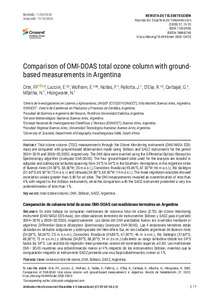Please use this identifier to cite or link to this item:
https://repositorio.uca.edu.ar/handle/123456789/11396| Título: | Comparison of OMI-DOAS total ozone column with ground-based measurements in Argentina Comparación de columna total de ozono OMI-DOAS con mediciones terrestres en Argentina |
Autor: | Orte, Pablo Facundo Luccini, E. Wolfram, E. Nollas, F. Pallotta, J. D'Elia, R. Carbajal, G. Mbatha, N. Hlongwane, N. |
Palabras clave: | INSTRUMENTOS DE MEDICION; DATOS GEOGRAFICOS; ESTACIONES METEOROLOGICAS; GEOGRAFIA | Fecha de publicación: | 2020 | Editorial: | Asociación Española de Teledetección | Cita: | Orte, P. F., Luccini, E., Wolfram, E., Nollas, F., Pallotta, J., D'Elia, R., Carbajal, G., Mbatha, N., Hlongwane, N. Comparison of OMI-DOAS total ozone column with ground-based measurements in Argentina [en línea]. Revista de teledetección. 2020, 57. Doi: 10.4995/raet.2020.13673. Disponible en: https://repositorio.uca.edu.ar/handle/123456789/11396 | Proyecto: | Análisis multidisciplinario de problemáticas ambientales y aplicaciones | Resumen: | Abstract: Total ozone column (TOC) measurements through the Ozone Monitoring Instrument (OMI/NASA EOS-Aura) are compared with ground-based observations made using Dobson and SAOZ instruments for the period 2004–2019 and 2008–02/2020, respectively. The OMI data were inverted using the Differential Optical Absorption Spectroscopy algorithm (overpass OMI-DOAS). The four ground-based sites used for the analysis are located in subpolar and subtropical latitudes spanning from 34°S to 54°S in the Southern Hemisphere, in the Argentine cities of Buenos Aires (34.58°S, 58.36°W; 25 m a.s.l.), Comodoro Rivadavia (45.86°S, 67.50°W; 46 m a.s.l.), Río Gallegos (51.60°S, 69.30°W; 72 m a.s.l.) and Ushuaia (54.80°S, 68.30°W; 14 m a.s.l.). The linear regression analyzes showed correlation values greater than 0.90 for all sites. The OMI measurements revealed an overestimation of less than 4 % with respect to the Dobson instruments, while the comparison with the SAOZ instrument presented a very low underestimation of less than 1 %. Resumen: En este trabajo se comparan mediciones de columna total de ozono (CTO) del Ozone Monitoring Instrument (OMI/NASA EOS-Aura), con observaciones terrestres de instrumentos Dobson y SAOZ para el periodo 2004–2019 y 2008–02/2020, respectivamente. Los datos del OMI analizados fueron los invertidos mediante el algoritmo Differential Optical Absorption Spectroscopy (overpass OMI-DOAS). Las 4 estaciones terrestres están ubicadas en latitudes subpolares y subtropicales del Hemisferio Sur, en las ciudades argentinas de Buenos Aires (34,58°S, 58,36°O; 25 m s.n.m.), Comodoro Rivadavia (45,86°S, 67,50°O; 46 m s.n.m.), Río Gallegos (51,60°S, 69,30°O; 72 m s.n.m.) y Ushuaia (54,80°S, 68,30°O; 14 m s.n.m.) cubriendo un rango latitudinal desde los 34°S hasta los 54°S. Los análisis de regresión lineal presentan valores de correlación superior a 0,90. Las mediciones OMI– DOAS muestran una sobrestimación menor al 4 % respecto de los instrumentos Dobson, mientras que la comparación respecto al instrumento SAOZ presenta una muy baja subestimación, menor al 1 %. |
Cobertura Espacial: | Argentina | URI: | https://repositorio.uca.edu.ar/handle/123456789/11396 | ISSN: | 1133-0953 1988-8740 (en línea) |
Disciplina: | INGENIERIA AMBIENTAL | DOI: | 10.4995/raet.2020.13673 | Derechos: | Acceso abierto | Fuente: | Revista de teledetección. 2020, 57 |
| Appears in Collections: | Artículos Artículos |
Files in This Item:
| File | Description | Size | Format | |
|---|---|---|---|---|
| comparison-omi-doas-total-ozone.pdf | 2,01 MB | Adobe PDF |  View/Open |
Page view(s)
139
checked on Apr 30, 2024
Download(s)
145
checked on Apr 30, 2024
Google ScholarTM
Check
Altmetric
Altmetric
This item is licensed under a Creative Commons License

